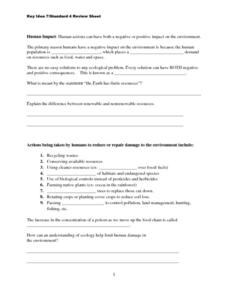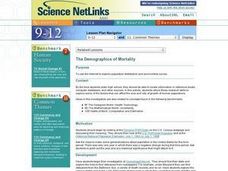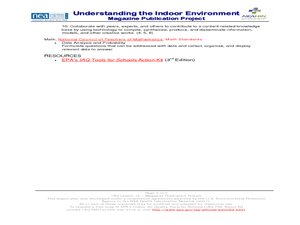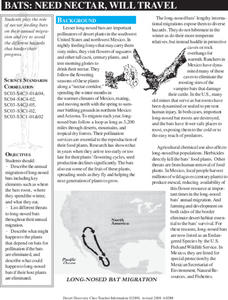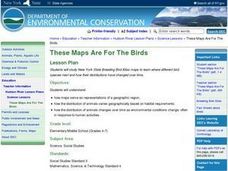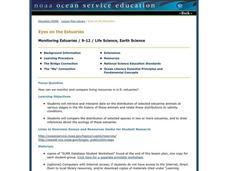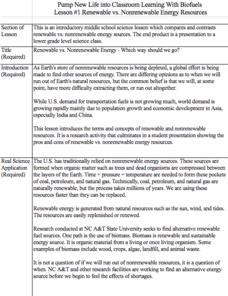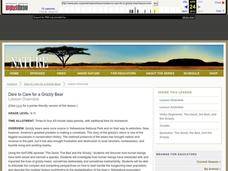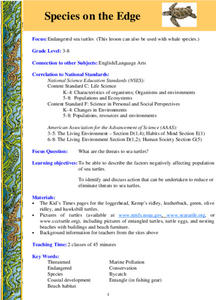Curated OER
Human Population's Response to Re-emerging and Emerging Infectious Diseases
Students examine the human population response to microbial diseases. In this disease activity students observe population trends, write about a scientist and evaluate and defend current treatments for infectious diseases.
Curated OER
Human Population Ecology: Demography
Students describe the basic concepts of population demography. They collect a wide range of data from an online cemetery database including a variety of places across the U.S. They analyze factors that may have affected human demography...
Curated OER
Standard 4 Review-Human Impact
In this human impact on the environment worksheet, high schoolers fill in the blanks to complete sentences about how humans have negatively affected the environment. They complete sentences about the actions taken to reduce and repair...
Curated OER
Human Ecology: How it Relates to Population
Ninth graders are introduced to the concept of population. In groups, they research the problems associated with overpopulation and underpopulation. They practice calculating birth and death rates and discus how they can be used to...
Pulitzer Center
The Global Water Crisis
High schoolers examine the "quiet crisis," the lack of clean water, by reading articles and viewing video clips. They discuss the situations in Ethiopia, Yemen, Kenya, and Nepal. There are two options for the lesson, but one of them...
Curated OER
Lesson 3: Understanding Population Growth
Young scholars explain population growth in Maryland and its relationship with age structure, household growth and consumption of land.
Curated OER
People and Parks in the U.S.A.
Fifth graders explore the National Parks in the United States. After locating specified states, 5th graders predict which states have the most National Parks. Given the population of each state, students determine the average acre per...
Curated OER
The Demographics of Mortality
Students view the Dynamic POPClocks on the U.S. Census webpage and discuss their meaning. They explore age-related death rates of the human population and collect information about the deaths of humans and organize them into a life table.
Curated OER
Indoor Environment: A Magazine Publication Project
Students demonstrate knowledge of Indoor Air Quality by creating a class magazine. A link to order a free Action Kit from the U.S. Environmental Protection Agency is provided so teachers can build background knowledge. Performance...
Curated OER
Bald Eagle Population Graphing
Students create graphs to illustrate the bald eagle population. They identify the population of bald eagles in Minnesota and the United States. They create three graphs to represent the population data including a line, bar, and...
Curated OER
Bats: Need Nectar, Will Travel
Beginning wildlife biologists become adult bats, baby bats, snakes, owls, bobcats, or land-clearing developers in a grand role-playing activity. In a large open space, they play a game in which they move to designated areas based on what...
Curated OER
These Maps are for the Birds
Students identify and study New York State Breeding Bird Atlas maps to learn where different bird species nest and how their distributions have changed over time. They also identify how maps serve as representations of a geographic...
Curated OER
The State of the Planet
Students address four different environmental topics (water issues, the threat of food shortages, human population growth, and global warming) as they watch a film and discuss the future of the earth. In groups, they complete various...
Curated OER
Eyes on the Estuaries
Students study estuaries and compare several ones in the U.S. In this estuary lesson students interpret data and compare the distribution of different species.
Texas State Energy Conservation Office
Investigation: Automotive Emissions and the Greenhouse Effect
It is recommended that you conduct this fabulous experiment as a whole-class demonstration. Collect air samples from the environment, human exhalation, and car exhaust, then compare them for carbon dioxide content using bromthymol blue...
Curated OER
You Need How Much Food When? Where?
Ninth graders explore how human activities shape the earth's surface. In this awareness instructional activity, 9th graders create pictographs showing the relations of food, people, land, and resources. Students complete worksheet.
Earth Day Network
Staying Green While Being Clean
Clean up the environment with a instructional activity that focuses on replacing hazardous cleaning supplies with green, environmentally-friendly products. Using a dirty patch of surface as a control area, kids clean other parts of...
Global Oneness Project
The Man and the Wolf
Human attitudes toward the big bad wolf come into focus in a photo essay that asks viewers to consider their own feelings about the endangered species.
Curated OER
What in Our World Affects the Way People Live
Sixth graders study various maps that show geographical features and population. They compare the maps and make inferences about how various geographical features influence the population and human activities of an area.
Kenan Fellows
Renewable vs. Nonrenewable Energy Resources
Is one type of energy inherently good or bad? Young scientists explore energy resources in a week-long unit. After extensive research, groups create powerful position statements and presentations supporting their energy resource of choice.
Curated OER
Panther Scavenger Hunt
Learners research the Internet to fill out their scavenger hunt sheet. In this research lesson students search the Internet for answers to the questions on the scavenger hunt worksheet.
Curated OER
Dare to Care for a Grizzly Bear
Students examine the relationship between humans and grizzly bears. In this biology lesson, students research about the bear's habits and living environment. They write a letter to the US Fish and Wildlife Service petitioning them to...
Curated OER
Species on the Edge
Students describe factors negatively affecting population of sea turtles, and identify and discuss action that can be undertaken to reduce or eliminate threats to sea turtles and other endangered species.
National Geographic
Australia, Antarctica, and Oceana
Go on a traveling adventure throughout Australia, Oceana, and Antarctica! This textbook excerpt offers a full unit of study that can easily be supplemented by extra projects or research materials. Learners study maps, read about...


